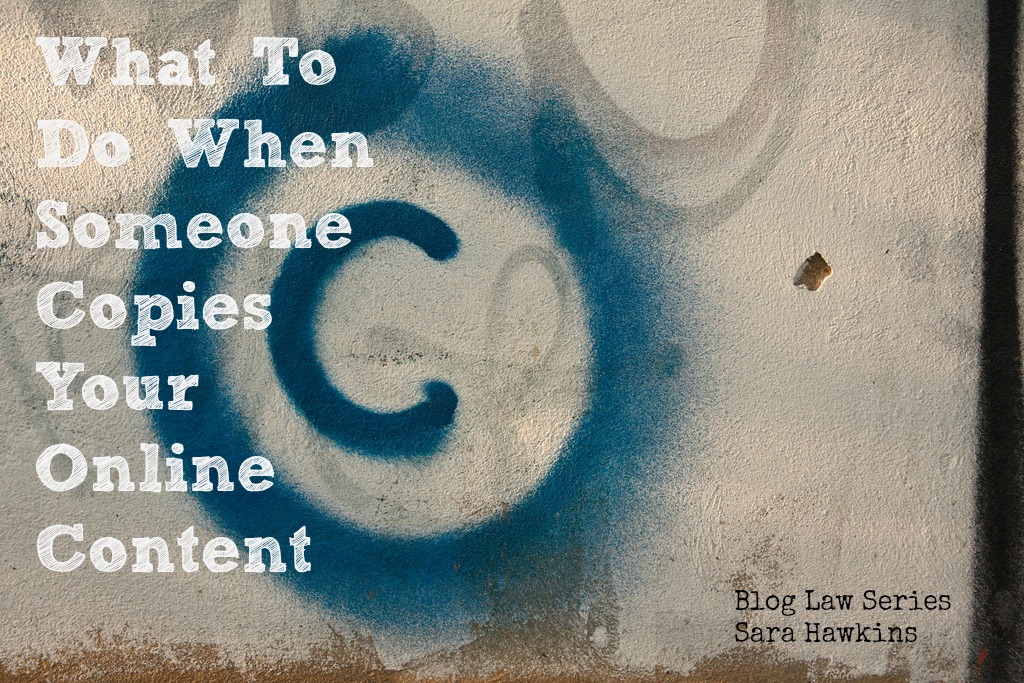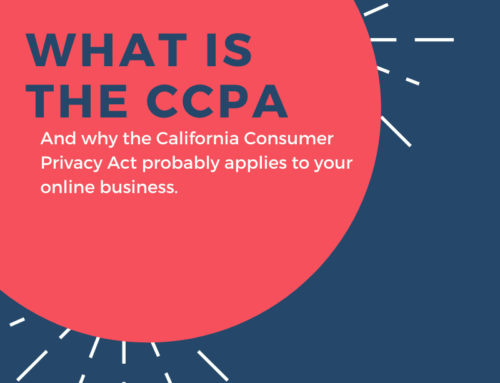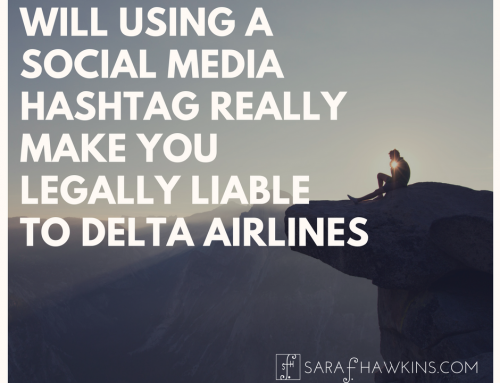
If I were to ask a room of online entrepreneurs if anyone has had their work copied without permission, I’m confident every hand in the room would go up.
When I was in law school learning about copyright and intellectual property, I had a very heavy laptop computer. Copying music meant making a mixed tape if you had a dual cassette tape or if you were lucky enough to have a CD/Cassette tape player you could record your CD. But music copying wasn’t all that easy, although it was done. Copying off the internet was done, but only by ‘hackers’ or ‘bad guys’. The internet existed but not anything like we know it today.
In the years since, I’ve spent plenty of time online. My first website was created in 1993. By today’s standards a 6 month old child could probably do better that what I’d done. Over the past 14 years, I’ve learned about the legal rights that grow with each of these platforms.
Remember Napster? It wasn’t a problem until artists realized they were getting ripped off. Gone were the days of recording music on a crappy cassette from the radio or your own boombox or relying on your friends to let you borrow their album. No longer are we relegated to having to use an electric typewriter or mimeograph machine to plagiarize.
Now, with the click of a mouse or touchpad anyone in any corner of the world can copy what you do and wholesale pawn it off as their own (plagiarism, at minimum). There isn’t much effort needed to steal not only words but also all the effort and ownership that goes with those words. And with enough know-how, people are creating bots and spiders to automate the copying process.
The written word has long been protected by copyright. And for well over 100 years, the US has recognized ownership of a person’s written work. Bloggers words are protected by copyright. And you don’t have to put a disclaimer on every page or any fancy wording. From the moment you hit publish, on works that are sufficiently original and meet the necessary requirements, you have a copyright. Plain and simple. Just because it’s on the internet doesn’t mean it’s in the public domain.
It’s not a laughing matter either. Many bloggers, big and small, have been copied. Copying a small blogger may seem like no big deal, arguing that they don’t have many readers. But what one may define as a small or less influential blogger is irrelevant. Copyright does not have as a defense ‘but I’m bigger than them’ or ‘but I’m smaller and not many people read it’.
What do you do if your work has been copied? Besides wanting to find the person and flame them openly on twitter . Or write a ranting post and hope they copy it and look ever more foolish. Or get all your friends in social media to give them a digital beat down.
Following are steps you can take if
your blog or website has been copied
1. Verify the copying – scan for duplication using a service like Copyscape. I don’t suggest doing a right-click and cutting and pasting the post from their page. If it is an image, be absolutely sure that it is your image. Verifying is usually pretty easy.
2. Document the copying – screen cap the offending material, print it out, PDF it. Whatever you do, get a copy of the material and make sure it is date/time stamped so you can further authenticate if the situation escalates. The goal here is to have proof that their material came AFTER yours. Do not rely solely on posting times. There are ways to make it appear that a post was made prior to when it really was. Be aware of this as it may come up.
3. If this is the first time this person has copied your post or image, send a nice email. You can often get some form of contact information on their site. If it’s a legitimate site there will be a way to contact them, even if it’s an embedded contact form. It’s better if you can get an actual email so you have record of the contact. But, if the only way is to use a built-in form then use that.
You should also check out domain registrars to determine if there is an email contact available. Use a site such as Who Is to find out who owns a domain. What do you say? (A) Identify the post in question both on your site and theirs. (B) State you have a copyright and ask them to do whatever it is you want such as take it down, link back, edit, etc. (C) Give them at least 24 hours and verify that whatever you asked to be done is done (D) Tell them how to contact you.
4. For repeat offenders or those who did not respond to the previous nice email, you’ll need to escalate your response. This is where you get to send the “Cease and Desist” letter (or email). A “Cease and Desist” letter is a formal legal document telling the copyright violator to take down the offending material or risk further legal action. These SHOULD NOT be sent without getting legal advice, even if it’s a call to your brother’s neighbor’s son’s soccer coach who is an attorney. Get professional advice! The Cease and Desist letter/email should be copied to the domain registrar, host and the major search engines’ legal departments. Each of these entities will have something on their websites telling you where to direct legal notices.
5. If nice didn’t work and ‘guess you didn’t think I was serious’ didn’t get any result, the big guns come out. With this, GET A LAWYER or DMCA Specialist! You will need to file what is known as a DMCA Complaint. See Google DMCA Complaint information. Digital Millennium Copyright Act (DMCA) is part of the US Copyright laws and specifically addresses copyright as it applies to the internet. The penalties for misuse of the DMCA Complaint are significant, so if you’re at this point because your blog is being copied and it’s causing you irreparable harm and loss of income then spend a few (hundred) bucks and get someone to do this who knows what they are doing. If the offender is found to have violated your copyright, the rewards can be significant.
6. Copyright laws and the DMCA do not require you to take any interim steps to have your copyrighted works taken down from any site that is violating your copyright. I suggest sending an email and a Cease and Desist out of courtesy, not because it is required by law. I do not always send them, depending on the circumstances. Then again, I am a lawyer and I have experience with this. I am not suggesting you resort to going straight to a DMCA Complaint, nor am I saying that you have to wait it out.
Copyright infringement of blog material is becoming more and more prevalent. It bothers me both as a blogger and as a lawyer because the topics you can write on are seemingly endless. Diana Adams of both Bit Rebels and Ink Rebels has even done the work for you in her post 100 Sources of Blogging Inspiration.
Copying someone else’s material says a lot about you as a person. Not only does it diminish SEO (Search Engine Optimization) for both sites, it speaks volumes to PR professionals and other bloggers. I understand that mistakes happen. New bloggers don’t always know the rules. Seasoned bloggers may not realize you shouldn’t do something like this. But if you make a mistake, apologize and take down the post. Don’t get up in arms, badmouth the blogger you copied or do anything public that you will likely regret later. The blogosphere will rally around the injured. Believe me on that one!
You may also be interested in reading:
Know Your Digital Rights – Blog Etiquette
Know Your Digital Rights – Recipe Copyright
photo credit: Horia Varlan used under Creative Commons, text added by Sara Hawkins





[…] Sara from SavingforSomeday.com wrote a create post about copyright infringement. I can link to it here, but if I used it in whole or in part, on my website, without getting her permission (and crediting […]
[…] Sara from SavingforSomeday.com wrote a create post about copyright infringement. I can link to it here, but if I used it in whole or in part, on my website, without getting her permission (and crediting […]
[…] What to do When Your Online Content is Copied by Sara Hawkins […]
Thanks for your post! It seems like a lot of work if your content is taken– is this all worth it?
[…] In our personal lives we plan meals; we create elaborate bullet journals and other calendars; we set reminders on our phone for important appointments. It’s always good to have a solid plan in place for life’s contingencies. We hope that dealing with plagiarism is something you’ll never experience, but if you are a writer it’s probably best to be prepared. What steps should you take in the event you discover that your intellectual property has been used elsewhere? Attorney Sarah Hawkins has some great advice (link to her original post is here): https://sarafhawkins.com/blog-law-what-to-do-about-blog-copying/ […]
my brother passed away and a shirt shop make t shirts with his picture that was on his facebook without permission…. with no proceeds going to the family….can my mother cease and desist???
Hello Monica, I’m sorry for your loss. Very few states provide publicity rights for deceased individuals and even then there is often a fame/infamy or celebrity aspect to that posthumous right. The shop had to have obtained the photo, and that photo may be copyrighted. If so, there may be a copyright infringement issue that can be raised. You’ll want to speak with an attorney knowledgeable on the topic to evaluate the full set of facts.